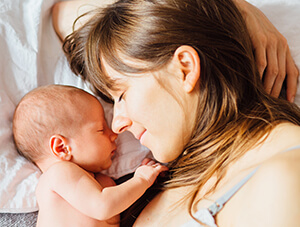Bonding with your baby
Bonding refers to the intense attachment you develop with your baby. It may include the feelings of love, affection and devotion, as well as the desire to protect her from all harm. The bonding process is unique for each parent and child. Here are a few things to keep in mind as you reflect on bonding with your baby.
Give it time
Research shows that bonding happens over time. Some parents may feel an instant bond with their baby the moment they see or hold him. For others it can take days, weeks or even months. Complications with the pregnancy and/or birth, difficulty with breastfeeding, and stress can all impact bonding. Don’t feel guilty if the feelings don’t come instantaneously. Focus on caring for the baby’s needs, cuddling and holding her, and don’t forget to take care of yourself. Be patient and gentle with yourself and trust that the feelings will come.
Ways to bond with your baby
- Regular skin-to-skin time. Cuddling your baby skin-to-skin has tremendous physical benefits for baby and can help establish a beautiful bond between you and your new child. Remember, skin-to-skin contact isn’t just for moms, other members of the family can take advantage of this bonding opportunity too!
- Learn about your baby. Understanding your baby will help you to enjoy him more. Pay attention to your baby’s cues and cries to try and learn what they mean. Is baby crying because she is wet, hungry, tired, overstimulated or bored? As you learn more about your baby you may find your bond deepening.
- Talk to your baby throughout the day. A baby learns to talk by hearing speech, and hearing more works during their first year of life impacts their language development and vocabulary. Talk to your baby about what you are doing throughout the day, describe to your baby what you are doing or seeing. Mimic your baby’s coos and gurgles. Read to your baby every day.
- Play with your baby. Through play, babies learn about themselves and the world around them. It also helps parents learn about their babies. Best of all, everyone has fun in the process. Choose a time when your baby is alert and satisfied. Try introducing one activity at a time. Keep the environment calm and cheerful.
When to be concerned
It is normal for you or your partner to experience a range of emotions after the birth of a child! You may feel happiness, joy, and love, but also overwhelmed, sad or anxious. Maybe all within a short period of time! If feelings of sadness, anxiety and agitation become severe, last longer than two weeks or you think of hurting yourself or others, please tell your health care provider. Your provider can evaluate you for postpartum depression. Not addressing postpartum depression can impact your relationship with your baby, partner and others.
